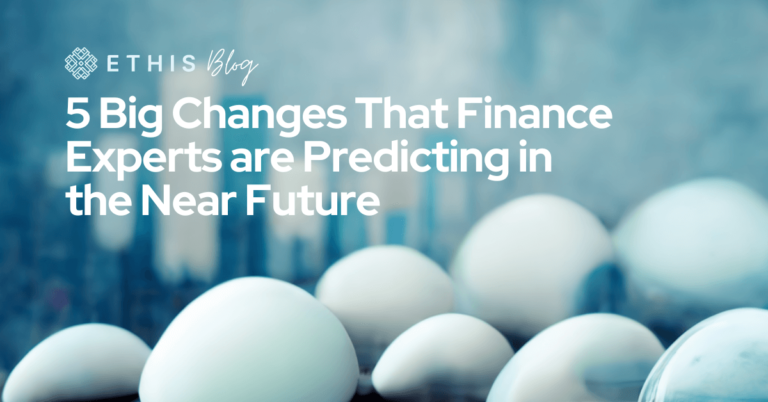
Between a barrage of disruptive technological innovations combined with the changing behaviours of consumer trends and a catastrophic pandemic that set the tide for plenty of economic burdens, the financial landscape has found itself once again in a malleable state.
The power to envision what lies ahead can make all the difference for investors, consumers, and the financial literate population.
Here are a few predictions from experts about potential developments that can determine how the future of finance will be paved.
Related: A New Digital Competency Framework for Islamic Banking and Finance
1. Decision-making based on data will increase corporate value


Better data and more trustworthy business information, according to nearly 88% of finance experts, are crucial components of the AP puzzle. A Deloitte survey of 784 worldwide finance leaders found that 40% of those polled either planned to use or were already using advanced data analytics.
However, only 10.1% of finance leaders had already put a fix into place. Few businesses can effectively aggregate, align, or integrate their data, which prevents them from realising the full benefits of digital transformation.
One cannot overstate the value of clean, high-quality data, particularly for businesses looking to save costs and improve efficiency. To make meaningful decisions, finance teams simply cannot rely on compartmentalised, sluggish financial data.
Finance teams can concentrate on reliably analysing spend data, finding useful insights, and improving day-to-day decision-making when data is automatically aggregated and vetted. This improves business outcomes.
2. A greater emphasis will be placed on the circular economy
The existing linear economic paradigm, which is based on the continuous creation, use, and disposal of items, is no longer sustainable, with concern about the human impact on the environment already at an all-time high. A circular economy will take its place, one in which a product’s full value is extracted before it is recycled and utilised again.
The result will be a sharp reduction in the environmental impact, waste, and energy use, as well as an increase in the general product efficiency. This can be used in a variety of sectors, including the food and manufacturing industries.
In a world where resources are limited and the climate issue is urgent, this will become unavoidable. According to a linear model, as the economy expands, so does the impact of waste brought on by commercial operations and product disposal, including greenhouse gas emissions and waste plastics. The circular economy can resolve some of these issues in various ways.
So, we’ll switch to a “restorative” production approach. There are many inventive methods to use resources in new ways and produce new items without further depleting natural resources, therefore recycled and reused products don’t necessarily have to be in their original form.
With this economic approach, people will feel more in control since they can see how the recyclables are used again, which will boost the rate of recycling.



3. The use of ethical frameworks is growing


Kai Yang, chief data officer, APA at HSBC, predicts that as authorities adopt a stronger and more proactive stance on the fairness of banking procedures and models, ethical AI frameworks will become a more prevalent aspect of responsible corporate governance.
Customers are also demanding more transparency over the usage of their data, therefore ethical AI culture will need to be ingrained into business identity. Financial services firms will work to develop AI and data ethics principles to create stronger frameworks for advanced AI adoption in the financial services sector.
4) More personalised financial products
Farouk Ferchichi, chief data analytics officer at Envestnet, predicts that banking will use AI to target offers and cross-sell products, create a hyper-personalised and unified client experience, and cut expenses.
Financial institutions will use AI to enhance and automate the monitoring of data quality, especially for product data that is used for regulatory reporting, given the continued regulatory pressure.
Financial institutions will have to rely on a combination of synthetic data to test models as well as backup data as the scope of model governance continues to broaden.
Organisations can use AI to segment product offers by target market and distribute them as part of a seamless, highly customised omnichannel client experience.
Related: New Developments Bode Well for Islamic Finance
5. Automating planning and forecasting


In this day and age, the force behind crucial transformation for a financial team is undoubtedly inclusive of automation.
Previously, an FP&A manager had to go through their data systems and hound team members from other departments to complete their work when it came to financial forecasting, budgeting, and planning. This disjointed approach lacked cohesiveness among all participants and was ineffective.
Presently, financial automation tools are dominating and modernising conventional forecasting techniques. Finance teams may now analyse their metrics from a single, internal platform rather than looking outside for data.
Some software even integrates communication tools right into the platform, enhancing teamwork among all members. Your complete tech stack can be integrated into a single solution with the help of the appropriate FP&A application.
Metrics extraction from separate data systems manually is no longer necessary. Finance teams will now be able to work on the financial analysis and strategic planning for which they were engaged to do by utilising FP&A integrations.
In the same way enterprise trends are directed more towards current and prominently pressing issues like social responsibility and contactless technology, the financial landscape meets many underlying concerns in a fast changing world. It’s clear that the institutions of today will be gradually integrating components related to AI, Big Data, and other 4.0 aspects in order to transform the way things work in the future. It’s up to us as individuals to stay vigilant to these upcoming trends.





Top Posts
Islamic P2P Crowdfunding Explained
Halal Money Matters: How Muslims Can Balance Deen and Dunya with Smart Islamic Finance
Halal Investments for Singapore Muslims? It’s time for a shake-up in the Islamic Investments scene.
Smart investment for making Halal money
3 Reasons Why Property Crowdfunding is the Smart Investment for You